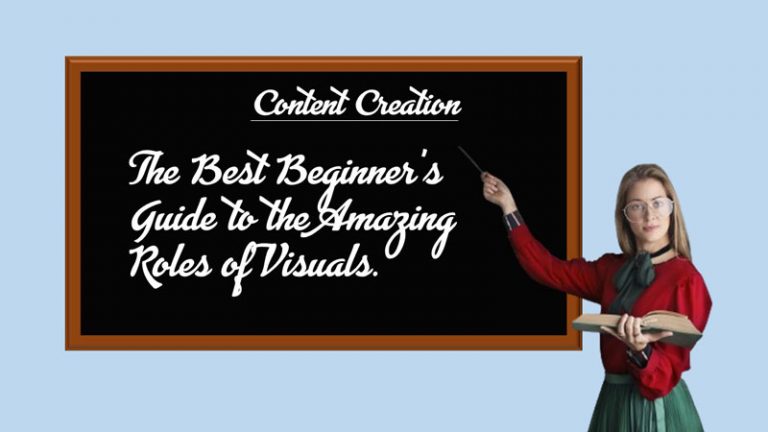The most common question I see and hear budding content creators ask on different online platforms is: “How do I become a content creator with no prior experience?”
If you’re an absolute beginner and have made up your mind to become a content creation professional, but do not know where to start or how to navigate your way into the ever-evolving content creation digital media landscape, never mind, I’ve got you covered.

In this article, I will answer the above common question by budding creators and show you the easiest way to begin a content creation career, without the help of a teacher.
Whether you aspire to become a writer, a YouTuber, a podcaster, or a social media influencer, the insights that I am about to offer you will serve as a roadmap and compass through the expansive and exciting journey of content creation.
Let the action begin!
20 Practical Guidelines to Help You Launch a Successful Career in Content Creation
Content creation, as you may have known, is a vital avenue for self-expression, communication, and business growth in today’s digital age.
Unlike some other professions, there are no strict educational or professional qualifications required for you to become a content creation.
However, while formal educational qualifications aren’t necessary to become a content creator, there are certain skills, traits, practices, and guidelines that can greatly enhance your success in this field.
Here are some of those important guidelines:
Guideline #1: Identify Your Passion
Your passion is your powerful and intense emotion or enthusiasm for something, often accompanied by a deep sense of purpose and strong motivation.
It is a strong emotional attachment to an activity, interest, hobby, cause, or pursuit.
Could it be for writing, talking, or cooking? Whatever it is, discover it.
It is important to identify your passion before you venture into content creation, because a genuine passion in your niche will help you remain motivated and committed to producing quality content regularly, and ultimately build a loyal audience over time.
Guideline #2: Choose the Niche that Suits You
Before diving into content creation, it is paramount that you identify your favourite niche.
To do that, ask yourself, “What topics or subjects am I genuinely interested in or passionate about?”
Providing a correct answer to this question will help you unearth your niche.
Finding your niche will not only enable you to create content that resonates with you but also attracts a more engaged audience who shares your interests.
In other words, to create content that resonates with your audience, you will need to have a deep understanding of your niche and industry.
Check out How to Choose the Best Content Creation Niche (Beginner’s Guide) for a clue on how to choose the right niche.
Guideline #3: Define Your Content-Creation Objectives as Clearly as Possible
Determine what you aim to achieve with your content creation efforts, as setting clear and attainable objectives is crucial to your content creator journey.
Does your goal involve building a personal brand, establishing yourself as an industry authority, informing, educating, and entertaining your audience?
Whatever your aim is, be clear about it, because having precise objectives will help to direct your content strategy aright.
Guideline #4: Develop and Enhance Your Skills
Content creation entails a range of skills. Below are some of the skills that are important for your content creation journey:
Strong Writing and Communication Skills
Being able to effectively convey your message through writing, speaking, or visual media is essential.
As a content creator, you will need to have strong writing and communication skills to create compelling and engaging content that resonates with your audience.
Clear and concise communication helps you connect with your audience and hold their attention.
Having a background in journalism, writing, or communication can be beneficial, though not compulsory.
Technical Proficiency
Basic technical skills are beneficial to content creators, though depending on the type of content you create.
For example, technical skills in areas like video production, graphic design, or website development, and being familiar with photo editing, video editing, and social media platforms, can be of immense help to you in producing and distributing high-quality content.
Storytelling Ability
Telling compelling stories is a cornerstone of content creation.
The ability to craft narratives that resonate emotionally with your audience can make your content more relatable and memorable.
Research Skill
Depending on your niche, you may need to conduct research to provide accurate and valuable information.
Strong research skills ensure your content is well-informed and trustworthy.
Data Analysis Skill
Being able to interpret data and analytics helps you understand what works and what doesn’t.
The information you’ll derive from this ability will guide your content strategy and optimization efforts.
Visual Eye
Having a “visual eye” as a content creator refers to the ability to perceive and interpret visual elements, aesthetics, and details in a way that enhances the quality and appeal of the content you produce.
This skill is particularly important in visual mediums like photography, videography, graphic design, and even in aspects of content creation such as web design and social media marketing.
A well-designed, visually appealing content piece can capture attention and make a lasting impression.
Marketing and Promotion Skills
Creating content is only half the battle; promoting it effectively is the other half.
You will need to be able to effectively market and promote your content to build a following and grow your business.
Understanding the basics of digital marketing, SEO, and social media promotion, and advertising strategies can help your content reach a wider audience.
So, learn them.
Entrepreneurial Skills
Starting a content creation business requires an entrepreneurial mindset, including the ability to manage your time effectively, set goals and deadlines, and work independently.
Having some business acumen can be beneficial.
While there are no strict qualifications required to start a content creation business, having a combination of these skills and knowledge can help you build a successful career in this field.
It’s important to continually develop your skills, stay up-to-date with industry trends, and produce high-quality, engaging content to attract and retain an audience.
Other Skills
Other skills that might, in one way or the other, be of help to you as a content creator are video editing and graphic design.
Dedicate time to learning and improving on these skills.
There are a plethora of offline and online courses and tutorials that can help you achieve this goal.
Guideline #5: Invest in Yourself, Invest in Important Equipment
While you need not possess the most expensive equipment or having all the equipment that you need, at the same time, having important ones such as a phone with a good camera, microphone, and editing software can significantly enhance the quality of your content.
Once you can get clear audio and sharp visuals, you’ll be sure to have high viewer engagement.
As time goes on and condition improves, you can start upgrading your equipment for a better service delivery.
Guideline #6: Practice, Practice, Practice!
The Holy Book advises us to be both the hearer and doer of the word of God.
In the same vein, as you develop and enhance your skills, do also make sure you put your skills into practice by creating content in your chosen niche.
As you continue to practice and practice your skills, so will you grow and become the master of your craft.
Doing otherwise would mean planning to fail.
Guideline #7: Create a Content Strategy for Yourself
Creating a content strategy means creating a content calendar that outlines the type of content you will be producing, and when.
Having a well-thought-out plan will help you stay on track and maintain a consistent flow of content.
Your content strategy, depending on your niche, should encompass a mix of long-form articles, video content, infographics, and more to cater to diverse audience preferences.
Guideline #8: Research Your Target Audience
Understanding your target audience is paramount for crafting content that resonates with them.
For you to understand your target audience, you need to conduct a thorough research, with a view to uncovering your audience’s preferences, pain points, interests, and demographics.
The comprehensive knowledge that will be derived from this process will help and enable you to tailor your content effectively to meet their needs.
Guideline #9: Be Creative, Be Original
Content creation is all about expressing your creativity and producing fresh, original, and engaging content.
Having a creative and imaginative mind and a knack for coming up with unique and interesting ideas for your content, innovative approaches, and engaging concepts can, and will set you apart from the crowd.
So, before you sit down to create your content, make sure you have your creative and originality cap on.
Guideline #10: Craft Valuable and Engaging Content
Nothing excites people like valuable and engaging content.
So, always make sure that our content offers value to your audience, whether it is for the purpose of information, education, or entertainment.
Put another way, always concentrate on delivering content that keeps your viewers returning for more.
In doing this, don’t forget to employ storytelling techniques, humour, and relatable anecdotes to connect with your audience on a deeper level.
Always, always strive to evoke emotions and spark conversations through your content.
Guideline #11: Prioritize Search Engine Optimization (SEO)
Search Engine Optimization, SEO, as you’ll soon discover or as you may have discovered, is crucial for making your content discoverable amidst the vast digital landscape.
To make this effective, you need to research keywords that are pertinent or related to your niche and naturally integrate them into your content, including titles, descriptions, and body text.
In addition to keyword optimization, focus on creating content that provides comprehensive and insightful answers to common questions and challenges within your niche.
Search engines, including Google, reward high-quality, informative content with better rankings.
So, don’t forget to prioritize SEO.
Guideline #12: Leverage Social Media
Content creators can gain a wide range of benefits from using social media platforms to promote their work.
Some of the key advantages include audience reach, engagement and interaction, content promotion, monetization opportunities, brand partnerships and collaborations, feedback and improvement, networking opportunities, building personal brand, data and analytics, learning and inspiration, community building, global exposure, among others.
It’s important to note that success on social media often requires consistent effort, creativity, and adaptability.

Different social media platforms have unique user demographics and engagement styles, so make sure you tailor your strategies to the platform and audience you aim to reach.
Additionally, algorithms and trends on social media platforms can change, so staying up-to-date with best practices is essential for long-term success.
So, do yourself a big favour by harnessing the power of social media platforms to promote your content and engage with your audience.
If possible, collaborate with influencers and participate in relevant communities to expand your reach.
Create a content distribution strategy that includes regular posting schedules, eye-catching visuals, and interactive content to foster a loyal following on platforms of your choice – Instagram, Twitter, Facebook, LinkedIn, etc.
Guideline #13: Embrace and Be Open to Feedback
Content creation often involves receiving feedback from your audience, peers, and mentors. This could be positive or negative, yet invaluable.
An open-minded approach to feedback can lead to continuous improvement as it aids in understanding what works and what requires improvement.
Encourage your audience to provide feedback through comments, surveys, and social media interactions and be open to making necessary adjustments based on the feedback received.
Always engage in conversations with your audience to build a sense of community and trust.
Guideline #14: Be Analytical, Be Adaptive
It is advisable that you form the habit of scrutinizing your content’s performance as regularly as possible, using a combination of analytics tools and metrics.
For example, always pay attention to views, engagement rates, click-through rates, and audience demographics.
Make it a point of duty to always utilize these insights to refine your content strategy over time.
Experiment with A/B testing to determine the most effective content formats, posting schedules, and promotional strategies.
Keep a close eye on emerging trends and adapt your content accordingly to stay relevant and maintain your competitive edge.
Guideline #15: Learn to Adapt to Changes
The digital landscape is always evolving, and even rapidly.
Therefore, be ready to adapt to rapid changes, as they occur.
Learning new tools, platforms, and formats will keep your content fresh and appealing to your audience.
Keeping up to date with trends, news, and developments in your niche can help you create valuable content that your audience will love.
Guideline #16: Be Patient, Be Resilient, and Persevere
Building a substantial following and establishing your brand, as a content creator, will take time to achieve.
This is because not every piece of content you create will be a hit; the road to success can be bumpy.
In other words, achieving success in content creation is not an overnight endeavour.
It demands consistent effort, resilience, and a willingness to learn from setbacks and failures.
Resilience allows you to learn from failures, adapt, and keep moving forward.
Stay resolute even in the face of challenges, criticism, or initial slow growth.
Since building a loyal audience and establishing your brand takes time, all you need do is to focus on the long-term goals and remain patient.
Having a long-term vision and the patience to see it through is essential.
You need to develop these ingredients of life through practice, learning, and experience.
While not all of these ingredients may be necessary for every type of content creator, possessing a combination of them can greatly enhance your journey and impact as a content creator.
Guideline #17: Network and Collaborate
Networking within your industry and collaborating with fellow content creators can open doors to new opportunities and expand your reach.
Collaborations can involve joint content projects, cross-promotions, and guest appearances on each other’s platforms.
Attending relevant conferences, webinars, and virtual events will help you connect with like-minded individuals for the purpose of positive collaboration.
Building a strong professional network can lead to partnerships, sponsorships, and collaborations that enhance your content and broaden your audience.
Do also consider joining relevant online content creation communities and forums where you can exchange ideas and gain insights from experienced content creators.
Guideline #18: Learn to Manage Your Time
Learn to manage your time because time, they say, is money, and time missed may never be regained.

Effective time management will help you juggle content creation, promotion, engagement with your audience, and other responsibilities.
Guideline #19: Stay Ethical and Authentic
Authenticity is the cornerstone of trust in content creation.
So always maintain ethical standards and authenticity in your pursuit of success.
Be transparent with your audience, disclose sponsored content, for example, and adhere to industry guidelines and regulations.
Share your personal experiences, challenges, and growth journey with your audience, because people connect with real stories and genuine personalities.
All in all, stay true to your values and voice throughout your content creation career.
Guideline #20: Monetize Your Content
Once you’ve built a substantial following and established your authority within your niche, consider exploring various monetization strategies.
These may include affiliate marketing, sponsored content, selling digital products or merchandise, and offering premium subscriptions or memberships.
Diversifying your revenue streams can provide stability and enable you to turn your passion for content creation into a sustainable source of income.
Content creation offers a plethora of opportunities for dedicated beginners willing to invest time and effort.
Discover as many of them as you possibly can and make better use of them.
How To Begin a Content Creation Career (20 Practical Guidelines): Conclusion
I would like you note that your journey as a content creator is not just about gaining followers or achieving viral fame; it’s about making a meaningful contribution to the digital landscape, just like the people you admire and follow.
So, embark on this adventure with enthusiasm, embrace the learning curve, and remain adaptable in the face of evolving technologies and audience preferences.
Stay true to your passion, values, and authenticity, for these are the cornerstones of a successful content creation career.
I encourage you to take these guidelines to heart, set forth on your content creation journey with purpose, and let your creativity flourish.
The digital world awaits your unique voice, and with dedication, persistence, and creativity, you can carve your niche and leave an indelible mark on the ever-expanding canvas of content creation.
By implementing these 20 practical guidelines, you can not only begin your journey in content creation but also thrive and make a lasting impact.
Best of luck on your exciting journey!
How To Begin a Content Creation Career (20 Practical Guidelines) THE END.
PS: If you enjoyed this post, How To Begin a Content Creation Career (20 Practical Guidelines), please, leave a comment below and tell us how much you love it and what you may want us to do to serve you better.




